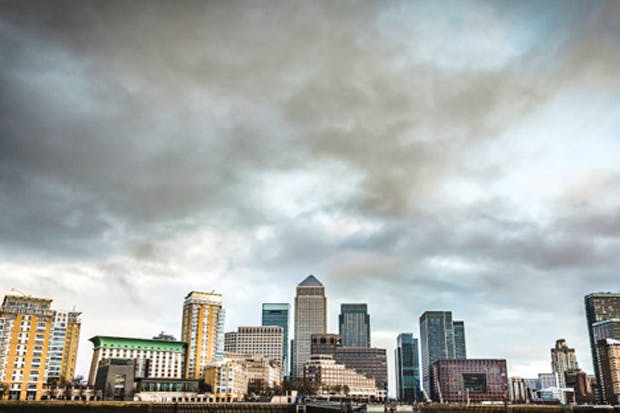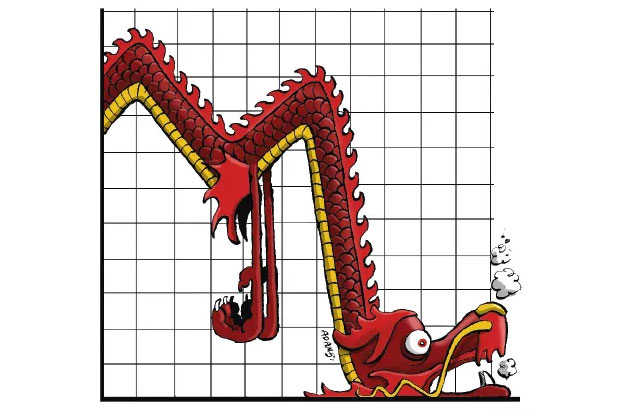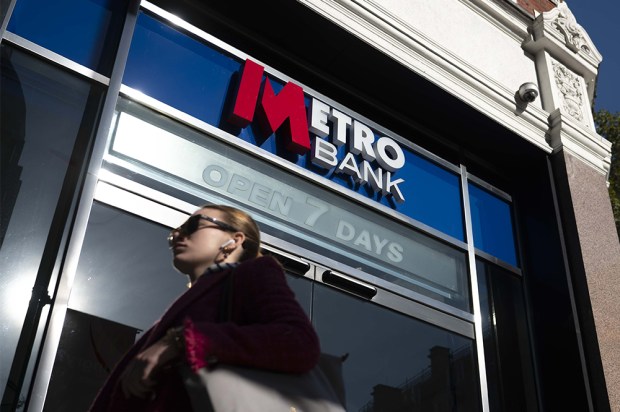All this talk of a new financial apocalypse, so soon after the last one, is starting to annoy me. Partly because investors as a crowd are so irrational; -partly because so much that governments and central banks have done to contribute to the current market mayhem seems to work against the sensible efforts of ordinary folk to build a bottom-up recovery.
Markets first. We’ve had hissy fits about China, even though connections between the Chinese and UK economies are so marginal. We’ve had near-hysteria about the prospect of (and in the US, the start of) rising interest rates. Now there’s a panic about European banks, because Deutsche Bank, midway through restructuring, looks weaker than it should; within days, traders are reassured about Deutsche but down on Credit Suisse. By the time you read this, they will have spotted another weakling — and short-sellers will make another killing out of it.
So it goes: markets are not just unreliable indicators, they are also populated by chancers and fools, and that makes them dangerous as mood-makers. If shares go on sinking, accompanied by swirling rumours about banks, then whatever the underlying truth, consumers will feel less confident and businesses will postpone investments and hirings. And we’ll talk a just-perceptible slowdown of a relatively healthy real economy straight back to recession.
But what is ‘the underlying truth’? And what have our leaders done to correct it? The ultra-low interest rates thought vital to stave off depression seven years ago are now a huge problem. Raising them could turn a ‘looming debt crisis’ into a real one, as well as provoking a bond-market crash; keeping them this low until the end of the decade, as now looks possible, would encourage the wrong borrowers to pile on more debt; turning them negative, as is happening in Japan, Sweden and Switzerland, looks like sheer desperation.
As for pumping liquidity into stalling economies through quantitative easing — for more of which the eurozone is anxiously hoping — we can see that it has diminishing returns, and adverse after-effects in the form of artificially boosted asset prices that are waiting to fall. It was the Monetary Policy Committee free-thinker Adam Posen who likened QE to a defibrillator: a one-off shock to keep the patient alive, not a thrice-daily treatment. Again, the more we see of it, the more we sense the authorities have no idea what else to do. And the sooner the doom will become self-fulfilling.
As for politics, could there be a worse moment to launch the Brexit debate, with all the uncertainty it brings? After every economic upheaval we ask who caused it: us, them, or all of us? This time it’s definitely them: the footloose investors, the grandstanding politicians and the monetary boffins who are still trying to solve the crisis before this one.
Who stands tallest?
Speaking of monetary boffins, I’m grateful to former Bank of England governor Mervyn King for the observation that ‘central bank governors have become shorter and shorter’. Tiny Dr Janet Yellen of the US Federal Reserve stands well below the shoulder of her 6ft 7in predecessor Paul Volcker, whose tight-money policies saved America from inflation in the early 1980s. In terms of presence, she also measures well below Alan Greenspan (during his tenure, that is, when markets credited him with supernatural powers, rather than the diminished hindsight view of him) and Ben Bernanke, whose quiet authority was based in deep study of financial history.
At the European Central Bank, Mario Draghi is almost a six-footer, and for a while — after he spoke of doing ‘whatever it takes to preserve the euro’ — he looked like the tallest leader in Europe. But right now they all look small, and Draghi is hunched against pressure from politicians to deploy monetary tools, whatever their consequences, in place of the structural reforms they themselves lack the will to deliver. Not one of them have the stature of Karl Otto Pöhl or Helmut Schlesinger, presidents of the pre-euro German Bundesbank.
As for our own governors, none in recent memory have had to stoop to pass through the Bank’s doors or stand on a box to make speeches, though it was said of Gordon Richardson by one observer in the 1970s, ‘His personality was such that he seemed to be tall — but he wasn’t.’
After Richardson, Robin Leigh–Pemberton likewise had a touch of grandeur, Eddie George had command of markets, and Mervyn King was a world-class economist. So what can we say about the incumbent Mark Carney, who George Osborne announced as ‘the outstanding central banker of his generation’ but who has turned out to be no more than a smooth technocrat, a dull public speaker and an uncertain forecaster? He’s probably the least -charismatic governor since Leslie O’Brien, before Richardson; history, I fear, will judge him no more than medium height.
Staying on
I’m guessing this column is well read in the boardroom of EDF. After I raised the alarm about the UK electricity gap two weeks ago, the French energy giant that largely controls our nuclear power sector decided to postpone decommissioning four existing reactors — one each at Hartlepool and Torness in Scotland, and two at Heysham in Lancashire — for up to seven years, to between 2024 and 2030.
I predicted long ago that this might have to happen. The postponement should cover the shortfall from delayed completion of the new Hinkley Point plant, assuming it ever happens: EDF still hasn’t made a final commitment. And it raises again my wider question for power bosses and civil servants. How can you go on closing capacity of all kinds — currently including coal-fired stations at Rugeley in Staffordshire and Fiddler’s Ferry in Cheshire — when you still haven’t got a comprehensive plan to replace it?
Got something to add? Join the discussion and comment below.
Get 10 issues for just $10
Subscribe to The Spectator Australia today for the next 10 magazine issues, plus full online access, for just $10.















Comments
Don't miss out
Join the conversation with other Spectator Australia readers. Subscribe to leave a comment.
SUBSCRIBEAlready a subscriber? Log in